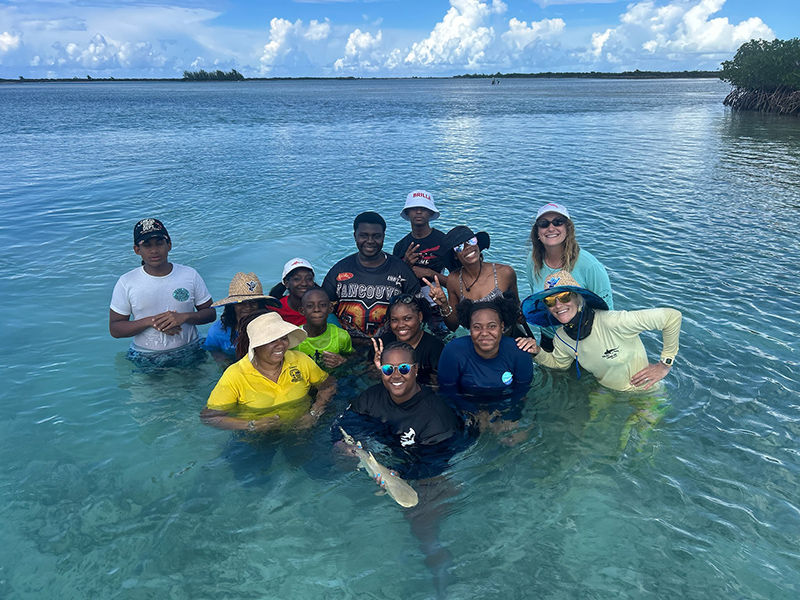Shark Week: Meet Biologist Dr. Misty Paig-Tran
- Sharks4Kids

- Jul 31, 2019
- 4 min read
Dr. Misty Paig-Tran is Assistant Professor at California State University Fullerton. Her laboratory (Functional Anatomy, Biomechanics, and Biomaterials) studies how animals feed and move, among other things. Her research is focused on big filter-feeding animals (Sharks and Manta rays).
Thanks Misty for sharing your shark story with us!!!

1. What is your favorite shark and why?
Ok this one just seems cruel to ask. Favorite shark? Is that a thing? If I had to pick one and say hands down this is my favorite, it would be megamouth shark because of any shark I have ever seen, it is the weirdest. I have the gill rakers from one I was lucky enough to get to dissect several years ago and I just stare at it from time to time and realize it is just too weird. I don't have ideas how they actually accomplish filter-feeding and it keeps me up at night. But I love whale sharks and pyjama sharks too for their level 10 cuteness. And angel sharks are probably a close 4th.

2. What is one species of shark you would like to see/dive with/study?
I would absolutely love to dive with chain catsharks. They are so ridiculously beautiful and yet I have never gotten a chance to see one either in the wild (dream) or in an aquarium yet.
3. What species of shark would you like to see on Shark Week?
I really want to see a whole special on deep sea sharks. Shark Week always focuses on white sharks or tiger sharks, but these are really not representative of the majority of sharks. So really any other types of sharks - dogfish, cat sharks, angel sharks, etc would be phenomenal to see. They are so complex and cool.
4. Can you tell us a little about your research on filter feeding species like whale sharks?
Oh yes, I definitely can. I love larger filter-feeding sharks in general (and rays too of course), but it turns out everything we thought we knew about how they capture prey is wrong. We used to think these sharks captured prey using their specialize zooplankton filters kind of like a kitchen colander. Anything larger than the colander pore size would stay while water exited out - think sieving spaghetti after cooking it. But that's not actually what happens. We are still actively trying to figure out how whale sharks, basking sharks, and megamouth sharks fully work. Right now I can tell you that it is definitely NOT sieving and it also looks like they (whale sharks) can actually target different sizes of plankton - especially small yummy fish eggs much smaller than the pore size of the filter. They do this (probably) by adjusting their filter sizes and the velocity of water through their mouth - but I have no idea yet how they are able do that although I am currently following some leads. We create little whale shark models in the laboratory using 3D printing and then watch how they capture food particles because trying to film small plankton in a whale shark's mouth while it eats is almost impossible. I know, I have tried many times!

5. What has been one of the most interesting things you have seen or learned while studying sharks and rays?
I learned that everything we once thought we knew about filter-feeding in sharks and rays is basically wrong. For example - we thought manta rays used a sieve mechanism to collect food particles, but it turns out they use a mechanism that was totally new to science and engineering called ricochet filtration.
6. What advise would you give young women who are interested in the field of marine science?
Keep pushing forward. There were many points in my career where people tried to derail me. People told me that I should go into a different field or that shark research was a boys club - but you know what, science is for everyone! Everyone doubts themselves sometimes. My personal motto is "that it is ok to feel dumb every day". I know that that "dumb" feeling means I am pushing out of my comfort zone and I am learning. If I am not learning, I am not growing in my field.
Also try to find good mentors that believe in you, so that even when you doubt yourself, you will have someone who will remind you how amazing you really are. Throughout my career I always kept in contact with Dr. Lara Ferry even when she wasn't my immediate adviser. It helped me remember that A) there are rock star women doing shark research and B) it helped ground me that I didn't have to fit a certain mold to do solid shark research.
7. What is one shark fact you wish everyone knew?
That sharks can pressurize their bodies for more effective swimming. Also that some sharks have helically wound collagen fibers in their skin that act like springs - the faster they swim, the more energy they can store. There is so much more to sharks then their bitey bits.





















